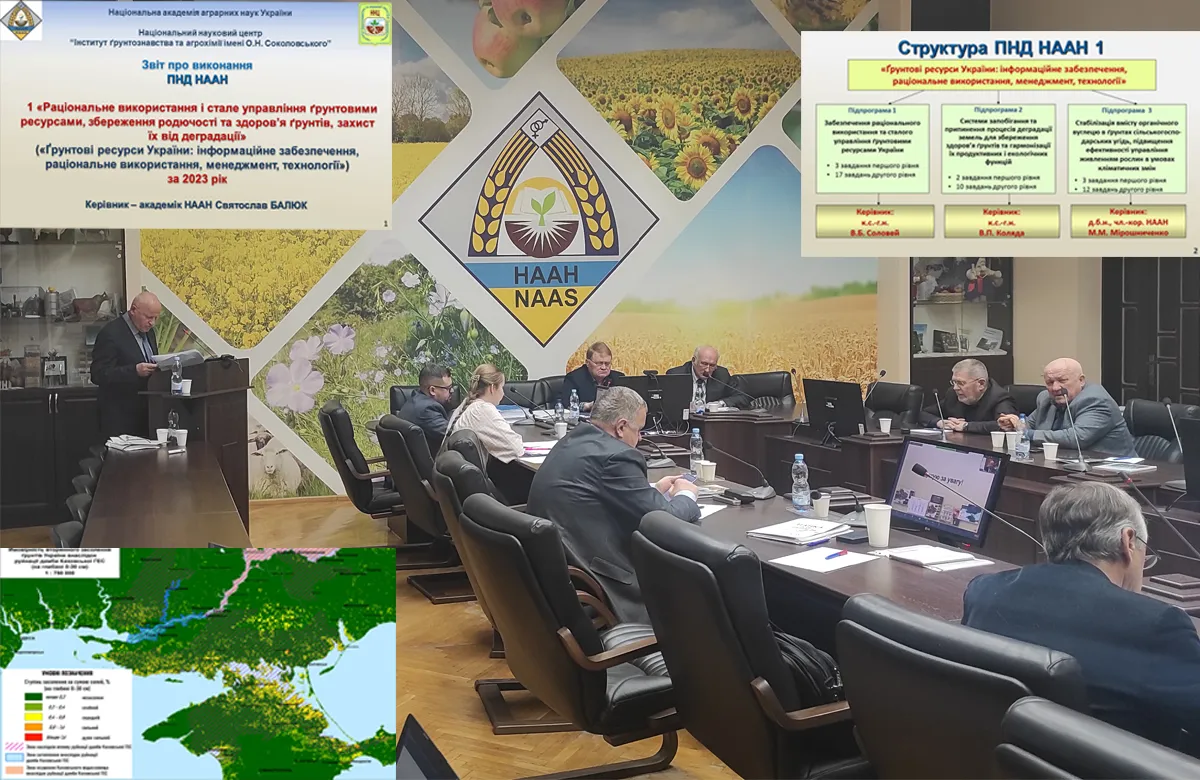Head of NSC iga Sviatoslav Baliuk On January 26, 2024, he reported at the meeting of the Extended Bureau of the Department of Agriculture, Land Reclamation and Mechanization of the National Academy of Sciences on the results of the Institute's work in 2023 on HDP 1 "soil resources of Ukraine: information support, rational use, management, technologies".
The report presents in detail the results obtained by scientists in the context of three subprograms:
Subprogram 1 "Ensuring rational use and sustainable management of soil resources in Ukraine". Supervisor-Candidate of Agricultural Sciences Vadim Solovey. (3 level 1 tasks and 17 level 2 tasks);
Subprogram 2 "Systems for preventing and stopping land degradation processes to preserve soil health and harmonize their productive and ecological functions". Supervisor-Candidate of Agricultural Sciences Valery Kolyada (2 tasks of the 1st level, 10 tasks of the 2nd level);
Subprogram 3 "Stabilization of organic carbon content in agricultural soils, improving the efficiency of plant nutrition management in the context of climate change". Supervisor-Doctor of Biology, corresponding member of the NAAS Nikolay Miroshnichenko (3 tasks of the 1st level and 12 tasks of the 2nd level).
One of the main areas of research included in each subprogram is the study of the impact of armed aggression and military actions on the current state of soil cover, the assessment of damage and damage, and the development of restoration measures.
The most important results for 2023.
- Proposals to legislative and regulatory acts of Ukraine on soil protection and reproduction of their fertility;
- Land Use and Protection Program (scientific publication);
- Impact of armed aggression on soil cover, damage and damage assessment, restoration measures;
- Soil and cartographic materials: updated map of the impact of military operations on the soils of Ukraine, digital map of the soils of the flood zone due to the explosion of the Kakhovskaya HPP, overview map "Zone of influence of the negative consequences of the destruction of the Kakhovskaya HPP";
- Improved system of classification and assessment of the degree of soil degradation caused by military operations as a result of the armed aggression of the Russian Federation;
- Methodology for assessing the feasibility of decommissioning arable soils that have undergone significant military degradation;
- Environmental monitoring system for agricultural land with different levels of intensity of agricultural production;
- Methodology for integrated management of plant nutritional status, taking into account spatially differentiated information on water supply and nutrient content in the soil (scientific and methodological publication).
In 2023, the implementation of the GDR took place under difficult conditions of martial law and limited funding. Nevertheless, the state receives modern tools for making managerial decisions on the problems of protection and management of soil resources both at the stage of martial law and at the stage of post-war revival of Ukraine.
Reviewers: A. D. Balaev, Doctor of Agricultural Sciences, Professor, Corresponding Member of the National Academy of Sciences of Ukraine, Professor of the Department of Soil Science and Soil Protection named after Prof. M. K. Shikula of the National University of Bioresources and Nature Management of Ukraine, E. G. Degodyuk, Doctor of Agricultural Sciences, Professor, Chief Researcher of the NSC " Institute S. A. Romanova, Candidate of Agricultural Sciences, Senior Researcher, Deputy General Director of the State Institution "Institute of Soil Protection of Ukraine" " as well as expert A. V. Bikin, Doctor of Agricultural Sciences, Professor, Corresponding Member of the National Academy of Sciences, Head of the Department of Agrochemistry and Quality of Crop Production. A. I. Dushechkina of the National University of Bioresources and Nature Management of Ukraine positively assessed the report.
A. S. Zarishnyak, M. I. Romashchenko, V. F. Kaminsky, S. Y. Bulygin, V. M. Bulgakov, V. I. Kravchuk joined the discussion. A positive assessment of the work of the scientific institution was given.
The report was approved and recommended for approval by the NAAS Presidium.


